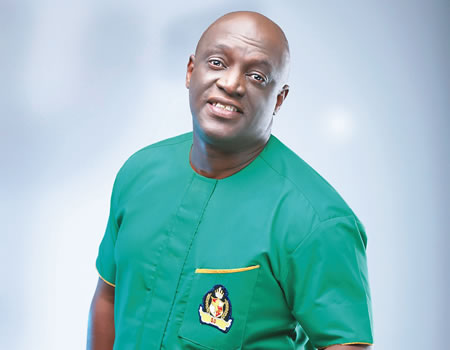You have been around for quite a while in the music industry, how has it been?
It has been quite an existing journey and I am glad to see it come to where it is now. The world is paying attention to gospel music coming out of Nigeria. A lot of emphasis is on Nigerian music industry at present. We are having a lot of international collaborations, our songs are having more presence in foreign churches all over the world and I think we’ve come to a good place, but the best is still to come.
You are a veteran in the industry, what is your staying power so far?
I like to evolve with time and sound. I am always conscious of what is going on around me and try to apply it to what I’m doing just to be sure that I’m compliant as far as the sound and the message is concerned. I work hard and I believe there is a reward for hard work. God doesn’t like lazy people, He blesses the work of your hands, so when there is nothing in your hands, there is nothing for God to bless.
Are you not feeling threatened following the emergence of many new acts?
There is nobody on the face of this earth that has the capacity to threaten me. I say that with all boldness and confidence. I am not competing with anybody, I understand my assignment and I am in my lane, I am functioning very well. There is only one Sammie Okposo, other people are going to come with different names. I like the fact that the gospel music industry is not as lonely as it used to be. When we started, not many of us were there and now, a lot of different expressions have come up and I love that. That makes those of us that came before them to continuously evolve. They are coming up with new ideas and sounds. Meanwhile, one can learn from anybody irrespective of age or experience. I study my environment and that is what keeps me relevant. Some of those who are now major names in the industry are people who used to sing background vocals for me and today, it gives me great joy.
What is your take on the idea in featuring secular artistes into gospel works?
That is an individual thing and there are some things that some people are comfortable with which other people aren’t. It doesn’t mean it is totally wrong, but it is not just my style, I am not comfortable with it. There are some people who are called to do certain things and there are some people who cannot. In our world today, there are people who can stand and fight the government, organise revolution, not everybody is born to do that. There are some gospel artistes who feel the music of the gospel is not for the church and that is my belief. Gospel is good news and they are taking it out there. Gospel artistes who are called to do these collaborations have my support, but that is not what I am called to do. It might be boring if all of us are doing the same thing. Personally, my philosophy is to go to campuses, take concerts to the prisons and perhaps minister in churches. This is a different ministry that some gospel artistes who collaborate with secular artistes do not do. At the end of the day, my concern is when we put it all together, it is for one purpose, but we all have different expressions.
Is it true that there are caucuses in the industry?
I don’t know about it. The industry is too big to have a caucus. If you do what you are to do well, you will get noticed, caucus or not. God knows how to reveal people, when the caucuses feel they have power that is when God starts to work. My philosophy is to keep doing what you are doing, you don’t know when you are going to be noticed. There are so many artistes in the secular world who were endorsed by corporate bodies before they released an album.
It seems you are the only gospel artiste that is endorsed by popular telecommunication company, Globacom
Whether you are doing gospel or secular music, you are charged with the task of making good music. The fact that it is gospel doesn’t mean it should be done with mediocrity. Music is music and there are different genres. Everybody has a different expression. They came to me when I released welu welu, which turned out to become a hit. They wanted the artiste and the sound that enveloped everybody. It wasn’t about being a gospel artiste, it was about the fact that I had a song that everybody was singing regardless of the fact that it was gospel.
How did you come about the Welu Welu song?
I am from the South-South and that is our sound. I have always wanted to expose that sound because it is so rich, it is our ethnic sounds in the whole of Nigeria. I was first a music producer and I have seen a lot of artistes come and go, there was no staying power. I started to research, I found out they were trying to be too foreign. In a country of millions of people, your target is Europe and America, this country can keep you busy. At some point, there was a switch when the Nigerian Broadcasting Corporation (NBC) made a decision on the percentage of local contents the radio stations must play. They started looking for the ones that have quality and ‘welu welu’ came out at that time. I was just blessed they picked it and it went viral.
Should gospel artistes charge fees in the vineyard?
People have different convictions. As a journalist, you might decide to handle a public relations package for someone that you want to support or you are interested in for free. Another colleague of yours might not do it for free, this doesn’t make that person a bad or better person. It is about what you are comfortable with. The fact that you are a gospel artiste does not mean you don’t have bills. If this is what you have chosen to make ends meet, as a career, there must be financial gratification. There has to be an exchange if a person has come to do his work. It is not just ministry, it is also industry and there has to be a balance.






